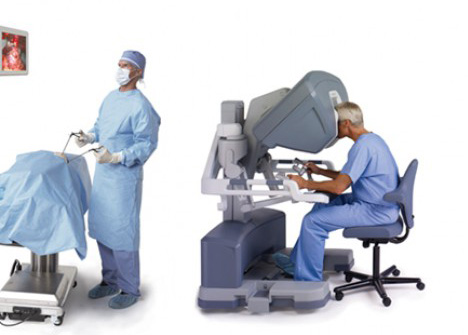Robotic Surgery
Robotic systems are becoming increasingly popular in the medical fraternity owing to the unique advantages including the precision, safety and many other advantages.
The da Vinci® robotic surgical system is one of the popular and widely employed robotic systems in the specialty of medicine and is used to perform surgical procedures in general surgeries and other specialties of medicine. The da Vinci® system offers a minimally invasive alternative option to traditional open and laparoscopic surgery. Most of the complex surgical procedures may be performed with the da Vinci® robotic system. Traditional open surgery uses a large incision and patients may experience complications such as pain, damage to the surrounding organs and nerves and long recovery period. In contrast, the da Vinci® robotic system is the most effective and least invasive technique which ensures faster recovery with minimal pain and minimal risks as compared with traditional open surgery.
The da Vinci® surgical system consists of a surgeon’s console, a patient-side cart with four interactive robotic arms, a high-performance vision system (3D camera) and miniaturized EndoWrist surgical instruments.
While performing the surgical procedure your surgeon will be seated at the da Vinci® console and is able to view a magnified, high-resolution 3D image of the area to be operated. To access the surgical site your surgeon introduces miniaturized EndoWrist instruments through few tiny incisions. These instruments help your surgeon perform the procedure with precision and control. Your surgeon uses master controls that function similar to forceps and in turn da Vinci® responds by immediate translation of surgeon’s directions into precise movements of miniaturized instruments.
The da Vinci® robotic system offers several advantages over the traditional surgery including less pain, low risk of infection, fewer complications, less scarring, less blood loss, short hospital stay and faster recovery.
The da Vinci® Robot System is considered safe and effective, but may not be appropriate for everyone. It is contraindicated in patients with bleeding disorders, history of previous surgery, pregnancy and cardiopulmonary diseases. Always discuss with your doctor about all treatment options suitable for you, as well as the benefits and risks.
Another first for da Vinci and Mediclinic Durbanville

While da Vinci robotic surgery is nothing new to Mediclinic Durbanville, with prostate surgery being performed since 2013, the advancement of skills amongst fellow surgeons has opened doors for a new range of confined space surgeries such as pelvic floor repairs and rectal cancer surgery. Both Dr Frikkie Rademan and Dr Reniel de Beer have recently undergone the rigorous training to certify themselves on the da Vinci robotic system.
Hillary Nortje, who was the first patient to undergo this robotic pelvic floor repair at Mediclinic Durbanville, is not new to these types of surgery done in the traditional and laparoscopic way. She underwent an initial pelvic repair several years ago with another surgeon, which was unsuccessful, as well as later undergoing a successful bladder operation. She explains her approach to the surgery, “After my initial operation I was reassured that the results would be a lot different this time round. Dr Rademan advised me to wait for the robotic option in my case and I am so happy I did. While I was apprehensive before the procedure the staff and doctors at Mediclinic Durbanville were so eager to explain each step of the procedure and the reasoning behind them. It was less invasive, my recovery was so much quicker and I only experienced a little discomfort from the incisions rather than actual pain. I am hoping that soon I can get back to a little gentle trail running or spinning which I have not been able to do for the last two years.”
Another first for da Vinci and Mediclinic Durbanville
New angle on pelvic floor disorders

As you drive north, up the N1 highway from Cape Town, you’ll pass Mediclinic Panorama – a hospital which offers excellent cardiovascular care. On the other side of the Tygerberg Hills you’ll find Mediclinic Durbanville: a newer hospital, but one which is already emerging as South Africa’s top pelvic hospital. One of the doctors behind this is Dr FJ ‘Frikkie’ Rademan, a specialist surgeon with an innovative approach to pelvic floor repair.
Nearly 25% of women experience pelvic floor problems, and those problems can be embarrassing and painful, with complications like prolapse resulting in symptoms like urinary or faecal leakage, constipation and difficulty with intercourse. When he operates, Dr Rademan uses laparoscopic surgery – a keyhole procedure which has him inserting a laparoscope (similar to a telescope) through a small incision to give him an on-screen view of the pelvic floor. Then, via three incisions in the patient’s abdomen, he uses instruments to lift and reattach the prolapsed organs using a mesh.
